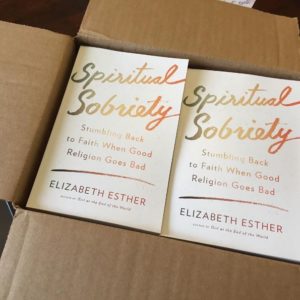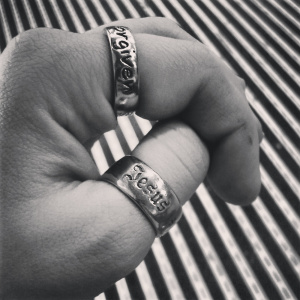Editorial Note: The following is reprinted with permission from Eleanor Skelton’s blog. It was originally published on June 9, 2016.
Another blogging friend, Laurie Works, introduced me to Elizabeth Esther’s blog back in 2014.
Recently I ran across her top ten signs of a spiritually abusive church YouTube video and I was so, so glad someone finally mentioned the dangers of “independent fundamental” churches like the ones I attended when I was a teenager, where most of the experiences that I write about came from.
Her more recent posts about the need for art to change as we get further and further out of that system have also been healing for me. Self-care is so vital and it’s not something cults encourage.
I didn’t reply to her survey last summer for Spiritual Sobriety because I wasn’t really in a place to do that yet, but I found her questions compelling and I couldn’t wait to read the book when it released this spring.
My friends and I who got out are healing and growing, but there aren’t many resources for people like us. Most people who shared our experiences are still on the inside. That’s why I was so excited about Elizabeth Esther’s new book and I wanted to know more. She and I did an interview for the release.
Here’s our conversation.
First, I’d like to ask you what specifically prompted you to write this book. What was the tipping point that made you realize that an unhealthy relationship between spiritual practice and addiction exists?
A lot of it was my own experience. I began to see similarities between the ways I used God addictively, in the same way that alcoholics rely on booze to escape pain, enhance pleasure and escape reality. I was sick of using God as a kind of “vending machine” to get what I wanted out of life. Knowing God is different than “getting things” from God. But when I began searching for a “sober” way of relating to God, I found that many churches only offered emotional experiences or magical thinking. Many churches were enablers!
Probably most of us have heard sermons interpreting Ephesians 5:18-20 to mean that we should be drunk on God the same way that you can get drunk with wine. How do you view this now, after writing your book?
I’m not gonna mock someone’s ecstatic experience with God. But I am going to suggest that too often we mistake “intoxicated” religious feelings for love of God. If love is real, it will be manifested in our actions—not just in how many awesome, amazing, WHOA worship/preaching conferences we attend. Scripture also tells us that we will know each other by the fruit of our lives. So, a lifelong journey of Christianity isn’t really about our conversion experience so much as everything that comes afterward. Are we kinder, gentler, more joyful, peaceful, patient, self-controlling? Those are the fruits of the Spirit. THAT’S what defines a true faith practice.
When you hear songs about giving all for God or being on fire now, what is your reaction to them?
I think those songs have a time and place and can be especially meaningful for brand new believers finding God for the first time. But those songs don’t do anything for me, personally, anymore. I don’t think those songs are SUPPOSED to define our entire faith experience. Because, like life, faith is a journey. I’m so glad I’m not a teenager anymore! I don’t need the hyped-up feelings because I know those can lead me into addictive burnout. When I hear those songs now I feel sorta like: “awww, that’s so cute.” But my tastes have changed. Or matured, maybe. I’m not really interested in the grand gestures or the huge, meteoric displays of passion or “giving it all to God.” I want something sustainable. A relationship that lasts a lifetime, not for one amazing summer. I know now that God doesn’t ask me to burn out for Him or to neglect myself to the point of a health breakdown. God likes me and delights in me and I’m just doing the best I can today, trusting that God will take care of the rest.
For those who have been spiritually abused and want to return to church attendance but are wrestling with reconciling their new perspectives and insights with the old memories, do you have any advice on where to start?
Start where you are. Take the pressure off. You have a whole lifetime to figure it out. There’s no rush. I would only suggest to keep trying. Even if that trying means giving up. Sometimes giving up is the best way to start! Here’s the good news: God isn’t going anywhere. You’re not going to “miss out” on God just because you don’t attend church. God is big enough to find us anywhere. Start where you are and let God find YOU. 🙂
– – – – – – – – – – – – – – – – – – – – – – – – – – – –
You can order Spiritual Sobriety here on Amazon. I’ll be posting my review soon.










